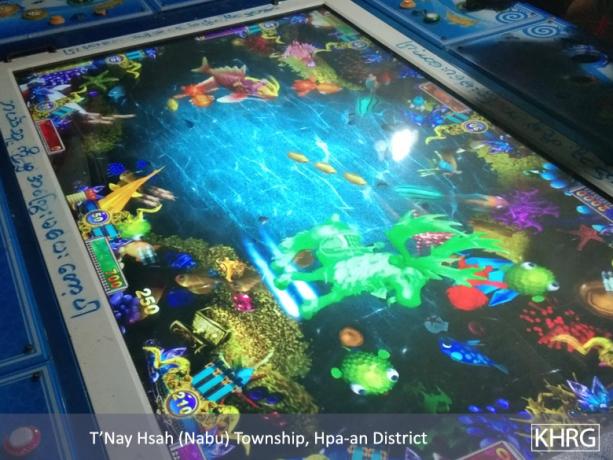In 2019, the KNU/KNLA-Peace Council (KNU/KNLA-PC)[1] built several gambling buildings in T’Nay Hsah (Nabu) and Ta Kreh (Paingkyon) townships for fundraising purposes, sometimes in cooperation with the Border Guard Force (BGF).[2] Gambling activities resulted in social disruption and led to an increase in theft and domestic violence in some villages. The local villagers are also afraid that gambling might ruin the future of young people, and therefore want these activities to stop. However, they dare not speak up against armed actors.[3]
T'Nay Hsah Township
In 2019, two gambling buildings were constructed between Htoh Kaw Koh and T'Weh Dah villages, Htoh Kaw Koh village tract. These buildings are run by the BGF and the KNU/KNLA-PC. They are close to each other and feature arcade fish shooting games.
Most of the villagers from T'Weh Dah village, and also people from far away, go to these buildings and gamble. Most of the local gamblers are young people. Their parents and the village head do not like this, but they dare not speak up against it [because the gambling buildings are run by armed actors]. Young people who gamble often end up pawning their motorcycles, phones and other belongings to get gambling money or pay their gambling debts. Their parents then have to pay to get these belongings back from the pawnshop. The villagers are facing a hard situation because of this.
In Keh K’Lah village tract, there are gambling buildings in Keh K’Lah and Noh Wa Klee villages, respectively. These gambling buildings were established in 2017. Gambling activities cause conflicts within local families, as a villager from Z--- village explained: “In some families, the wives, husbands and children do not listen to each other, and quarrels have occurred […]. Some spouses have got divorced. These are the results of engaging in gambling.”
In Htoh Kaw Koh village tract, there are also gambling buildings in Kyaw Toh and T’Weh Dah villages, respectively. In Noh Htah Baw village tract, there is a gambling building located between Noh Hta Baw and Htee Wa Shuh villages.
Gambling activities have led to an increase in theft and domestic violence. Even though they do not want gambling buildings in their area, the affected villagers cannot do anything. They are afraid to speak up because these activities are run by the KNU/KNLA-PC in cooperation with the BGF, under the authority of KNU/KNLA-PC Operations Commander Bo Kyaw Kyaw from Operations Command #3.
Ta Kreh Township
During the summer[4] of 2019, investors [in cooperation with the KNU/KNLA-PC] came to install arcade fish shooting games in Kaw A--- village, Noh Kwee village tract. The village head was worried for the future of the local children so he organised a consultation meeting with local villagers and the village tract administrator [KHRG was not able to find out the exact date, but it took place during the summer of 2019]. The village head and the villagers decided that they did not want the gambling activities to take place [in the village], but the village tract administrator did not oppose them [the gambling activities].
The KNU/KNLA PC’s request to build a gambling place in this area was ultimately accepted by the local authorities because the KNU/KNLA-PC told the Karen National Union[5] that the gambling activities would only take place over a short period of time. The gambling building is small, but the KNU/KNLA-PC initially wanted to build a bigger one. Most of the people who gamble are KNU/KNLA-PC soldiers because the village tract administrator warned the villagers not to gamble. The KNU/KNLA-PC reportedly wants to close this gambling building, as it does not generate enough income, but they have not done so yet.
These photos were taken during the summer of 2019 inside a gambling building in T’Nay Hsah Township, Hpa-an District. They show local villagers gambling on arcade fish shooting games. [Photos: KHRG]
Footnotes:
[1] The KNU/KNLA PC is an armed group based in the Htoh Kaw Koh village tract area, Hpa-an District. It split from the Karen National Union (KNU) and signed a ceasefire agreement with the Myanmar government in 2007, but refused to transform into a Border Guard Force (BGF) in 2010. It signed the Nationwide Ceasefire Agreement in October 2015.
[2] Border Guard Force (BGF) battalions of the Tatmadaw were established in 2010, and they are composed mostly of soldiers from former non-state armed groups, such as older constellations of the DKBA, which have formalised ceasefire agreements with the Burma/Myanmar government and agreed to transform into battalions within the Tatmadaw.
[3] The present document is based on information received in August 2019. It was provided by a community member in Hpa-an District who has been trained by KHRG to monitor human rights conditions on the ground. The names of the victims, their photos and the exact locations are censored for security reasons. The parts in square brackets are explanations added by KHRG.
[4] Summer in Myanmar extends from March to May.
[5] The Karen National Union (KNU) is the main Karen political organisation. It was established in 1947 and has been in conflict with the Burma/Myanmar government since 1949. The KNU wields power across large areas of Southeast Myanmar and has been calling for the creation of a democratic federal system since 1976. Although it signed the Nationwide Ceasefire Agreement in 2015, relations with the government remain tense.








